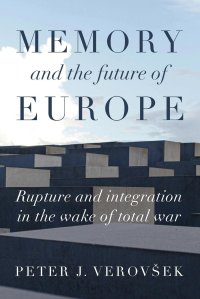
Ebook: Memory and the Future of Europe: Rupture and Integration in the Wake of Total War
Author: Peter J. Verovšek
- Year: 2020
- Publisher: Manchester University Press
- City: Manchester
- Language: English
- pdf
The development of the European Union as a community-based project of integration with decision-making powers outside the constitutional architecture of the nation-state is the most significant innovation in twentieth-century political organisation. It raises fundamental questions about our understanding of the state, sovereignty, citizenship, democracy, and the relationship between political power and economic forces. Despite its achievements, events at the start of the twenty-first century – including the political, economic, and financial crisis of the Eurozone, as well as Brexit and the rise of populism – pose an existential threat to the EU.
Memory and the future of Europe addresses the crisis of the EU by treating integration as a response to the rupture created by the continent’s experience of total war. It traces Europe’s existing pathologies to the project’s loss of its moral foundations rooted in collective memories of total war. As the generations with personal memories of the two world wars pass away, economic gain has become the EU’s sole raison d’être. If it is to survive its future challenges, the EU will have to create a new historical imaginary that relies not only on the lessons of the past, but also builds on Europe’s ability to protect its citizens by serving as a counterweight against the forces of globalisation. By framing its argument through the critical theory of the Frankfurt School, Memory and the future of Europe will attract readers interested in political and social philosophy, collective memory studies, European studies, international relations, and contemporary politics.
Memory and the future of Europe addresses the crisis of the EU by treating integration as a response to the rupture created by the continent’s experience of total war. It traces Europe’s existing pathologies to the project’s loss of its moral foundations rooted in collective memories of total war. As the generations with personal memories of the two world wars pass away, economic gain has become the EU’s sole raison d’être. If it is to survive its future challenges, the EU will have to create a new historical imaginary that relies not only on the lessons of the past, but also builds on Europe’s ability to protect its citizens by serving as a counterweight against the forces of globalisation. By framing its argument through the critical theory of the Frankfurt School, Memory and the future of Europe will attract readers interested in political and social philosophy, collective memory studies, European studies, international relations, and contemporary politics.
Download the book Memory and the Future of Europe: Rupture and Integration in the Wake of Total War for free or read online
Continue reading on any device:

Last viewed books
Related books
{related-news}
Comments (0)